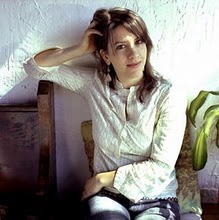M.J. Rose: The Hypnotist
September 21, 2011 by David
Filed under Fiction, WritersCast
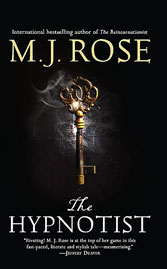 978-0778329206 – Mira Books – paperback – $14.95 (e-book and audio book editions available)
978-0778329206 – Mira Books – paperback – $14.95 (e-book and audio book editions available)
M.J. Rose is a critically acclaimed novelist – she’s best known for her thrillers, of which The Hypnotist is one. It’s in a series with The Reincarnationist and The Memorist, all them with reincarnation as a central theme. MJ’s characters are compelling and well drawn, and her stories are complex and original, the books are fun to read and impossible to put down. What more could you ask of a novel?
M.J. is also well known among writers for her activism in behalf of writers, and her brilliant understanding of marketing. But that’s a different conversation than the one we had about The Hypnotist, a book I deeply enjoyed reading, for me perfect as I got to read the book on vacation, and it is way better than most books we think of as “beach reads.” As one reviewer said: The Hypnotist has “something for everyone: murder, suspense, history, romance, the supernatural, mystery and erotica.”
The detective Lucian Glass becomes deeply involved in the pursuit of anti-hero Malachai Samuels, whose Phoenix Foundation is committed to the study of reincarnation (at almost any cost). Glass is a tortured soul whose own life connects him to the present and past day lives of other characters in this novel. It’s a complexly drawn story and one that will reward readers, even those who have no interest in the paranormal or esoteric metaphysical subjects that are do beautifully woven through the story. You will enjoy the denouement, and the story will stay with you long after you have turned the last page of the book.
Rose is a skillful writer who treats her readers to a high level of originality and surprising story making. She is also fun and rewarding to talk to about her books, as she shows in this insightful interview. She has a great website, a couple of blogs, and aside from having written 11 works of fiction, she has also co-authored two books about writing, and has been profiled in Time Magazine, Forbes, The New York Times, Business 2.0, Working Woman, Newsweek and New York Magazine, and has been on many television shows. She is also the founder of the very successful book promotion business, AuthorBuzz.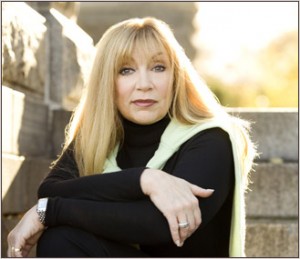
Podcast: Play in new window | Download
Nick Mamatas: Sensation
July 21, 2011 by David
Filed under Fiction, WritersCast
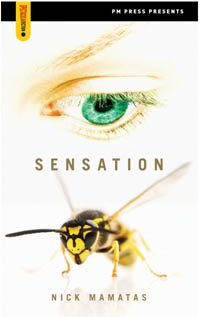 978-1604863543 – PM Press – paperback – $14.95 (e-book editions available)
978-1604863543 – PM Press – paperback – $14.95 (e-book editions available)
“When Julia Hernandez leaves her husband, shoots a real estate developer, and then vanishes without a trace, she slips out of the world she knew and into the Simulacrum—a place where human history is both guided and thwarted by the conflict between a species of anarchist wasps and a collective of hyperintelligent spiders. When Julia’s ex-husband Raymond spots her in a grocery store he doesn’t usually patronize, he’s soon drawn into an underworld of radical political gestures where Julia is the new media sensation of both this world and the Simulacrum.”
Nick Mamatas is an incredibly inventive writer. Sensation combines comedy, inter-species communication, fantastic imagination, social and political critique into a fast moving, tightly plotted and very unusual storyline. By combining a science fiction bent with a hyper-real portrayal of modern digitally connected culture, Mamatas is able to play with all the elements of modern everyday life, so we see things differently, perhaps even more clearly.
In some ways like The Matrix, there is an invisible world around and behind our own. Fittingly, in Sensation, that world is essentially woven by a species of spiders that has created an very special relationship with the human world, one that is far from predictable and complicated in its own right. These spiders care about humans, protect them, and use them for their own purposes in an ongoing war with a parasitic species of wasps. On this unlikely and unusual premise, Mamatas has built a fantastic story.
I enjoyed reading this book on a number of levels, not the least of which for the author’s simultaneously dark, comedic and critical approach to our modern digital, paranoid, corporatized and controlled society. I do like it when a novelist can successfully include political critique in a work of fiction. Mamatas is an accomplished writer with a dystopian outlook I enjoy. And similarly I enjoyed our conversation about this book and the author’s approach to writing. I think you will appreciate his approach to talking about his work.
“Nick Mamatas continues his reign as the sharpest, funniest, most insightful and political purveyor of post-pulp pleasures going. He is the People’s Commissar of Awesome.” — China Mieville, award-winning author of Kraken and The City and the City
Nick’s website is well worth a visit as well as his online journal (Nihilistic Kid).
Podcast: Play in new window | Download
Anna Lappe: Diet for a Hot Planet
July 2, 2011 by David
Filed under Non-Fiction, WritersCast
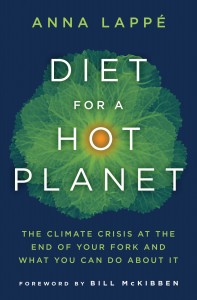 978-1-60819-465-0 – Bloomsbury – Paperback – $15.00 (ebook editions available)
978-1-60819-465-0 – Bloomsbury – Paperback – $15.00 (ebook editions available)
Anna Lappe´ is the daughter of the well-known activist and writer Frances Moore Lappe´, author of the classic Diet for a Small Planet, a book that introduced Americans to the idea of thinking about food and its role in ecology and the world economy, and how food is so deeply intertwined with economics and politics. Anna has therefore been involved in food issues since she was a child. She and her mother collaborated on another interesting and challenging book, Hope’s Edge in 2002. So it’s not a surprise that she is so thoroughly cogent and coherent writing and talking about food issues in the context of climate change.
As Anna says on one of her many website, takeabite.cc, “the food system is responsible for as much as one-third of all greenhouse gas emissions. These emissions are particularly alarming because the food sector is the biggest driver behind methane and nitrous oxide emissions, which have global warming effects many times more powerful than carbon dioxide.” In Diet for a Hot Planet, Lappe´ goes straight to the heart of the issue: if we are going to think about the global climate crisis, we have to think about our food system, and if we are going to make change to mitigate the effects of climate change, we must make changes (now) in the global industrialized food system that dominates most of the world today.
This book was extensively and deeply researched; Lappe´ talked to many scientists, went to UN, governmental, corporate, and grassroots agriculture conferences, worked her way through many lengthy and dense reports and studies, and also visited organic farms around the world.
In this book she has put together an impressive array of facts proving that global industrial agriculture—specifically the use of hazardous chemicals, concentrated animal feeding operations, biotech crops, and processed foods—is impoverishing the land, destroying rain forests, polluting waterways, and emitting nearly a third of the greenhouse gases that are heating the planet.
By contrast, intelligently designed and operated organic-farming methods reduce carbon emissions and toxic waste while at the same time nurture soil and biodiversity. Lappe´is convinced (and will likely convince you) that eating according to ecologically appropriate principles can not only influence the marketplace and help combat world hunger and climate change, but will make us healthier and safer as well. Lappé also decodes food labeling, exposes Big Ag’s “greenwashing” tactics, and offers “seven principles of a climate-friendly diet.”
With a terrific foreword by the brilliant Bill McKibben, Diet for a Hot Planet should be essential reading for anyone who is trying to grapple with making real change in the way we live on this fragile planet. Anna is a terrific public speaker and our talk for WritersCast is lively, full of information, and optimistic and positive as Anna herself.
Anna Lappe´related organizations and websites should be on your bookmark list:
Take a Bite Out of Climate Change
Podcast: Play in new window | Download
Publishing Talks: David Wilk Interviews Frank Rose
June 13, 2011 by David
Filed under Ebooks and Digital Publishing, PublishingTalks, The Future
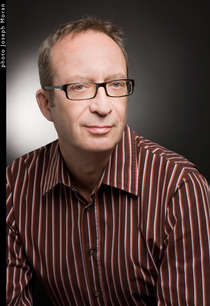 In this series of interviews, called Publishing Talks, I have been talking to book industry professionals and other smart people about the future of publishing, books, and culture. This is a period of disruption and change for all media businesses. We must wonder now, how will publishing evolve as our culture is affected by technology, climate change, population density, and the ebb and flow of civilization and economics?
In this series of interviews, called Publishing Talks, I have been talking to book industry professionals and other smart people about the future of publishing, books, and culture. This is a period of disruption and change for all media businesses. We must wonder now, how will publishing evolve as our culture is affected by technology, climate change, population density, and the ebb and flow of civilization and economics?
I hope these Publishing Talks conversations can help us understand the outlines of what is happening in the publishing industry, and how we might ourselves interact with and influence the future of publishing as it unfolds.
These interviews give people in and around the book business a chance to talk openly about ideas and concerns that are often only talked about “around the water cooler,” at industry conventions and events, and in emails between friends and they give people inside and outside the book industry a chance to hear first hand some of the most interesting and challenging thoughts, ideas and concepts being discussed by people in the book business.
Frank Rose is a journalist and author, most recently of a book called The Art of Immersion, How the Digital Generation Is Remaking Hollywood, Madison Avenue, and the Way We Tell Stories. I could easily have interviewed him about that book, which is interesting enough in its own right (and later this year I plan to talk to him about it for WritersCast).
But for this conversation, I wanted to talk to Frank about how writers are adapting to the changes wrought in publishing by the advent of digital books.
Frank has recently reprinted another one of his books, one that has been out of print for a number of years; it fits the profile of a fine book from the recent past that cannot be published or re-published commercially anymore. That book is called West of Eden: The End of Innocence at Apple Computer. It’s about the power struggle at Apple that ended up with Steve Jobs being pushed out of the company he had helped found. West of Eden was originally published in 1989 at which time it was a national best-seller and was rated as one of the ten best business books of the year by BusinessWeek.
In 2009, Frank published an updated version of the book himself for Amazon’s Kindle, as well as a digitally printed paperback edition under his own press name (Stuyvesant Street Press) and the book has been doing quite decently. One assumes that there are a fairly large number of people today who are interested in and knowledgeable about the history of modern computing and the computer industry. Enough for an author, if not for a commercial publisher to make a reasonable profit from publishing this book digitally.
Currently Frank writes for Wired, where he has been a contributing editor for almost ten years. Before this assignment, he was a contributing writer at Fortune, writing about Hollywood and global media conglomerates, he’s also been at Esquire, Premiere and Travel + Leisure, and has written for the New York Times Magazine among many other magazines. And he began his writing career at the Village Voice covering the emerging punk scene in Lower Manhattan in the ’70s.
Chances are good that Frank Rose’s experience as an author turned publisher will be reflective of a myriad of similar authors in the next few years. And perhaps will indicate some interesting opportunities for other segments within the publishing ecosystem.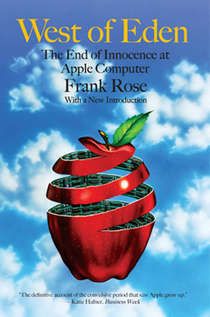 I think this conversation will be interesting to many in the book business who are thinking about how roles are changing in publishing, especially as digital publishing creates so many new opportunities for easy distribution to readers.
I think this conversation will be interesting to many in the book business who are thinking about how roles are changing in publishing, especially as digital publishing creates so many new opportunities for easy distribution to readers.
More on Frank Rose here. More on West of Eden at Amazon.
Podcast: Play in new window | Download
Mary Sharratt: Daughters of the Witching Hill
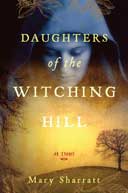
978-0547069678 – Hardcover – Houghton Mifflin Harcourt – $24.00
I really enjoyed reading this book and came to admire its author, not only for her writing skills, which are very good indeed, but because she was able to so deeply and movingly inhabit her characters in a place and time so foreign from our own. Mary Sharratt’s novel is transcendent in many ways. It centers around the years leading up to the 1612 Lancashire, England, witch trials that resulted in the executions of nine supposed witches. Mary Sharratt has brilliantly imagined her story, in which witchcraft is real, albeit not evil in the way the accusers made out. It’s much more complicated – in fact this witchcraft is the folk medicine and healing power of the local spirits of pre-Christian England. Never preachy, Sharratt gives us a countryside where politics and money separate people from one another, and crushing poverty is the lot of so many.
Widowed mother Bess Southerns supports her family and friends by healing the sick, telling fortunes, and blessing those facing misfortune, conjuring charmes that combine forbidden Catholic ritual, medicinal herbs, and guidance provided by her spirit-friend, Tibb. Bess is always careful, knowing the dangers her powers create for her but eventually everything unravels in a series of events that finally gets Bess, her family, friends and supporters into inevitable trouble with the law. Sharratt has crafted a beautiful historical novel that brings this era to life and gives its people she writes about a deep and complex life that many will find surprising. The conflicts between religions, as well as the conflicts between class are here, as well as mystery and suffering and beauty too. The book is set in the English countryside where the author, an American, currently lives. It’s clear to me that Mary Sharratt has allowed this place to inhabit her, as much as she it. She has put together a beautifully crafted story, full of complexity and compelling characters, and even knowing how the book must end, I was hooked from beginning to end.
As a reader I was transported there with her, and found her story uplifting, painful, and beautiful all at the same time. This is a wonderful book.
In my interview with Mary, we talked about her experience as an American living in the English countryside, and how she came to write this book. We talked about the story itself, her characters, their lives, the nature of English witchcraft of the 16th century, power and politics and the warp and weave of her excellent story.
Podcast: Play in new window | Download
Joann Davis: The Book of the Shepherd
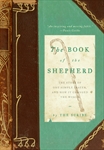 978-0061732300 – Hardcover – HarperCollins – $19.99
978-0061732300 – Hardcover – HarperCollins – $19.99
The Book of the Shepherd: The Story of One Simple Prayer and How it Changed the World is a beautifully written parable that made me think of writers like Paulo Coelho and Kahlil Gibran. The conceit of the book is that the author finds a manuscript in a house in Vermont, and has it translated, thus this story. It’s a short book, and an easy read, but of course, because it is a parable, the book demands to be re-read and thought about deeply.
The story has no distinct place or time. Joshua is the shepherd who is troubled by the code of “an eye for an eye” that governs his world. He has a dream about “a new way” and sets off on a quest to find it.
Stone the builder who erects a house that falls on its occupants. Sever the hands of the criminal who pilfers livestock or grain or another’s garment. Whip the child who defies an elder. For such is the law and the law must be obeyed.
For generations, these ironclad rules had governed the people. Nobody questioned whether it was right to humiliate a child or execute a murderer. An eye for an eye was the way of the world.
But was there another way?
Joshua is accompanied by Elizabeth, a former slave who is kind and generous, and David, a boy who must learn to walk in new shoes. Joshua believes that “an age of miracles” will come when the new way is found.
As with any quest, there is adventure along the way. En route to a cave near the Great Inland Sea, the travelers meet a number of interesting and compelling characters, including the Storyteller, the Apothecary, the Blind Man, and the Stranger. Each passes on an important lesson as the travelers journey toward what we realize is their destiny. At the cave, Joshua must see if he can bring forth secrets long buried. But he, Elizabeth, and David will discover that what they have been searching for has been inside them all along. In the end, The Book of the Shepherd is compelling and meaningful, whatever your political, social or religious outlook or beliefs. It’s not heavy handed or preachy, and even for many secularists, will be well worth the investment of time to read.
Joann Davis is an experienced writer and former book editor. She is extremely articulate and passionate about her work, and was a pleasure to interview. We talked about her work as a writer, her own spirituality, and how The Book of the Shepherd can change people and the world for good.
Podcast: Play in new window | Download


